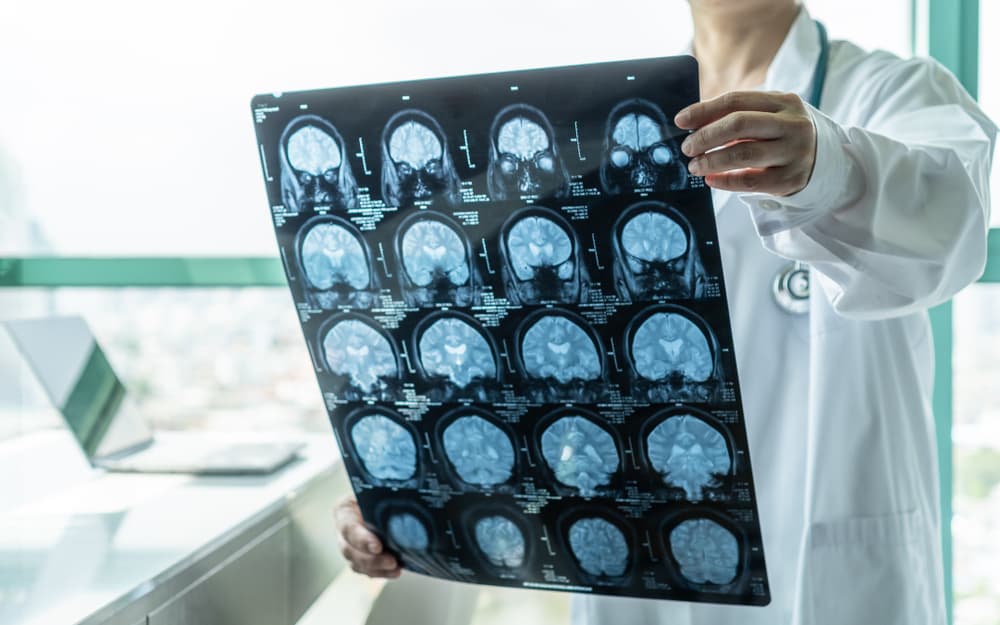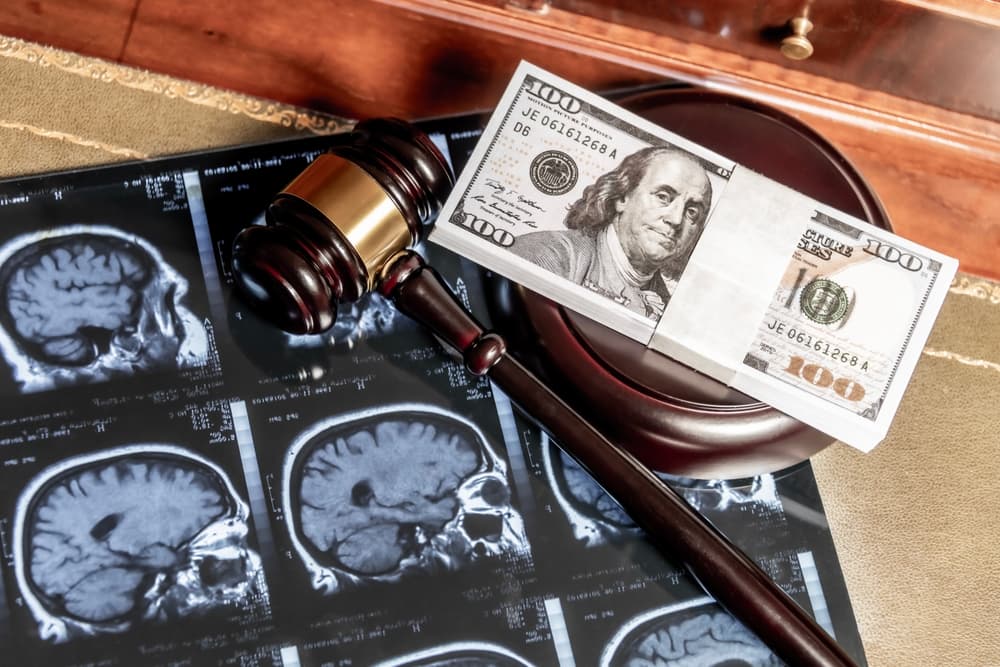Suffering a traumatic brain injury (TBI) is often life-altering. It affects the health, quality of life, and financial stability of the victim and their family. This makes it imperative to pursue the maximum compensation available when you seek a payout based on your accident and injuries.
You need a lawyer who understands the nuances of TBI cases to receive the compensation you deserve. Discuss your rights and legal options with an experienced personal injury lawyer before preparing and filing an insurance claim or lawsuit on your own or on behalf of an injured family member.
Schedule A Consultation Today!
How Much Is a Brain Injury Case Worth?
There is no way to know how much your Florida TBI claim might be worth. Too many factors play a role in determining a fair settlement range, and case details could affect your ability to secure compensation within that range.
A better question is, “What damages can I recover based on my accident and TBI?” Your attorney should answer this question early on in the case.
You may recover a wide range of damages based on your TBI, including:
- Medical Expenses: This includes all past, current, and future medical costs related to the injury, such as hospital bills, rehabilitation, physical therapy, medication, and any necessary medical equipment.
- Lost Income: If the injury prevents you from working, you can claim compensation for lost income. This also includes loss of earning capacity if you cannot return to work in the same job and earn the same income as before.
- Pain and Suffering: This is compensation for the physical pain and suffering and emotional distress you endured because of the accident and your TBI and other injuries. These intangible losses often comprise a significant portion of the damages in a TBI case.
- Loss of Enjoyment of Life: If the injury affects your ability to enjoy day-to-day activities and hobbies, you can seek compensation for this non-economic loss.
- Permanent Disability: If your or a loved one’s TBI caused a long-term or permanent disability, the claim can include damages for the effects on lifestyle and independence.
- Loss of Consortium: This is compensation for the injury's effects on personal relationships, such as with a spouse.
What Factors Affect the Value of a Brain Injury Case?

Many factors influence the potential value of a brain injury case. When victims and their families pursue a personal injury case based on negligence, they must negotiate a fair settlement or count on a jury to award a fair settlement. Under these circumstances, there are many reasons why they might deserve a higher payout or settle for a lower amount.
This could include:
- Severity of the Injury: More severe injuries typically result in higher payouts. They typically lead to more extensive medical treatment, rehabilitation, and long-term care needs. They are also more likely to lead to an inability to work and earn a living and additional non-economic losses.
- Age of the Victim: Younger victims might receive higher compensation, especially if they suffer life-altering injuries and will require ongoing care. Young people who lose independence and cannot work or provide self-care frequently have the largest payouts.
- Effect on Earning Capacity: If the injury affects your ability to earn a living, this will significantly increase the claim's value. Some people with TBIs return to their careers or can work a job and make a living. For those who earn a significant income but can no longer work, this could greatly increase the value of a case.
- Pre-Injury Health and Lifestyle: The better your health and more active your lifestyle before the injury, the more likely you will receive higher compensation if your injuries limit your activities. This is especially true if the injuries cause lasting disabilities.
- Strength of the Case: Clear evidence of the other party’s liability and negligence will strengthen your case and potentially increase the settlement. The evidence in the case must show fault, liability, and your full range of damages.
- Whether the Case Goes to Trial: Sometimes, a jury trial allows victims to recover more money than an insurance settlement. To this end, you might recover a larger payout if you take the case to trial than you will negotiate a settlement. A personal injury lawyer can assess your case and determine if this is a good reason to go to trial.
- The Experience of the Party Managing the Case: When you have a skilled attorney filing your case and negotiating with the insurance carrier, you may recover more money than you could on your own. They can identify and document additional damages, hire expert witnesses to estimate future care costs, and use proven negotiation techniques to reach an agreement.
Possible Causes of Traumatic Brain Injuries
Many accidents and incidents cause traumatic brain injuries. According to the Florida Agency for Health Care Administration (AHCA), 41,305 people visited Florida emergency departments for non-fatal traumatic brain injuries in one recent year. There were also 5,654 deaths related to brain injuries.
Many of these injuries could support a personal injury lawsuit or civil case. In general, anytime someone else’s careless, reckless, or intentional act causes a serious injury, the victim can hold the at-fault party responsible. Some of the ways this causes TBIs include:
- Motor Vehicle Accidents: Car, motorcycle, and truck collisions are common causes of brain injuries. This occurs due to the forces involved in these accidents. TBIs are also common when careless drivers hit pedestrians and bicyclists.
- Fall Accidents: Falls can lead to brain injuries. This can include slips, trips, stair falls, and falls from an elevated height. While people generally think of falls as relatively minor accidents, some injuries can be serious or catastrophic.
- Workplace Accidents: Construction sites and other potentially hazardous job sites pose significant risks for traumatic brain injuries.
- Intentional Acts: Violent attacks can cause severe brain injuries. This includes assaults and similar criminal actions, although the criminal and civil cases are completely separate.
The best way to learn if your accident and injuries will support a personal injury claim is to speak to an attorney familiar with TBIs. They can assess your legal options based on your information about what happened. Most personal injury law firms provide free initial case consultations.
How Does a Victim Know Who is Liable for Their Brain Injury?
Negligence laws generally determine who is liable for a personal injury. This includes traumatic brain injury cases. Under these laws, victims must provide evidence to establish negligence to identify the liable party and hold them accountable.

Four elements show negligence occurred:
- Duty of Care: Demonstrating that the defendant had a legal obligation to ensure your safety, such as a driver following all traffic laws
- Breach of Duty: Showing that the defendant breached this duty through action or inaction, usually violating a traffic law in our example
- Causation: Proving that the breach directly caused your brain injury, typically done through relevant medical records and expert testimony
- Damages: Providing evidence of the damages you suffered as a result, such as medical bills, receipts, income statements, and more
While we rarely think of it in such terms, we often owe others around us a duty of care. Some examples include:
- Motorists must follow all traffic laws to prevent crashes
- Property owners must keep their properties free from unreasonable hazards
- Construction site owners must follow all industry rules and regulations to keep workers and guests safe
When you work with a lawyer to manage your case, the law firm will identify all potentially liable parties and investigate what happened to build a case against them. They gather evidence to show that party failed to uphold their duty, this caused your TBI, and you incurred expenses and losses as a result.
How Do Personal Injury Cases Work, and What Evidence is Necessary?
Understanding how personal injury cases work can help you recover compensation after a TBI or your loved one with serious, lasting brain injuries.
However, working with an attorney simplifies this process and the time you will need to learn to navigate the legal system, build a case, and fight for the money you deserve.
While each case has its own legal strategy and approach, injury cases typically follow these steps:
- Consultation: You meet with a lawyer to discuss your case and determine its viability. This could occur on the phone, in person, or via teleconference. This could occur while the victim is still in the hospital, rehabilitation, or otherwise undergoing care.
- Investigation: Your attorney will gather evidence to develop a strong case to support your payout. This could include collecting medical records, accident reports, witness statements, and expert testimonies.
- Filing a Claim: Once they have strong evidence and a compelling claim, the lawyer will submit the necessary paperwork to the at-fault party’s insurance company or file a lawsuit in the appropriate civil court.
- Negotiation: Your lawyer will likely attempt to reach a settlement out of court through negotiations with the at-fault party’s insurance company or lawyer.
- Trial: If a settlement isn’t possible, the case proceeds to trial. A judge or jury decides the outcome based on the evidence presented in the courtroom.
Building a solid case that convinces the insurance adjuster, judge, or jury that you or your loved one deserves a fair payout is at the heart of recovering compensation after a traumatic brain injury accident.
If you do not work with a personal injury lawyer, you must understand the necessary steps and evidence to collect to show what happened, who is responsible, and the damages it caused.
Some common evidence in a TBI case includes:
- Medical records documenting the injury and treatment
- Accident reports
- Witness statements
- Video, when possible
- Expert testimony from medical professionals
- Documentation of lost wages and impact on earning capacity
Why Should a Victim Hire a Lawyer Instead of Trying to Manage Their Case on Their Own?
Many traumatic brain injury victims cannot consider managing their own claims. Their injuries cause difficulties with focus, concentration, and attention span. They may also have lasting cognitive impairments.
At the same time, their loved ones are unlikely to have the knowledge or resources to develop a strong case, either. It is very difficult for individuals to recover fair compensation on their own.
Hiring a lawyer could allow you and your family to recover more money than you could on your own, even after paying attorney’s fees. Personal injury law firms have the time and money to manage in-depth investigations, pay experts, and efficiently handle claims.

Working with an attorney offers several advantages over handling a case on your own:
- Knowledge and Experience: Lawyers understand the complexities of personal injury cases and can navigate legal procedures efficiently. They are also aware of how traumatic brain injuries affect victims and will seek full compensation based on the facts of the case.
- Negotiation Skills: Lawyers are skilled negotiators who can secure higher settlements than you might achieve on your own. Not only could they have stronger evidence, but they often identify additional types of damages victims overlook.
- Legal Strategy: They can develop a robust legal strategy to strengthen your case and present compelling evidence. They provide advice and guidance throughout this process.
- Stress Reduction: Managing a legal case while recovering from a TBI can be overwhelming, if not impossible. A lawyer handles the legal aspects, allowing you to focus on healing and recovery.
- Maximized Compensation: Lawyers work to ensure you receive the maximum compensation possible for your injuries. This requires documenting your damages, valuing non-economic losses, and estimating future expenses.
Navigating a traumatic brain injury case requires careful consideration of many factors. Recovering fair compensation is crucial to your future care and rehabilitation. Consulting with a knowledgeable personal injury lawyer can make a significant difference in the outcome of your case.
Discuss Your Florida Brain Injury Case With Our Team for Free
At Lulich & Attorneys, our team of personal injury lawyers provide free consultations for victims of traumatic brain injuries and their families. Call one of our offices today to get started:
- Vero Beach: (772) 589-5500
- Sebastian: (772) 492-4611
